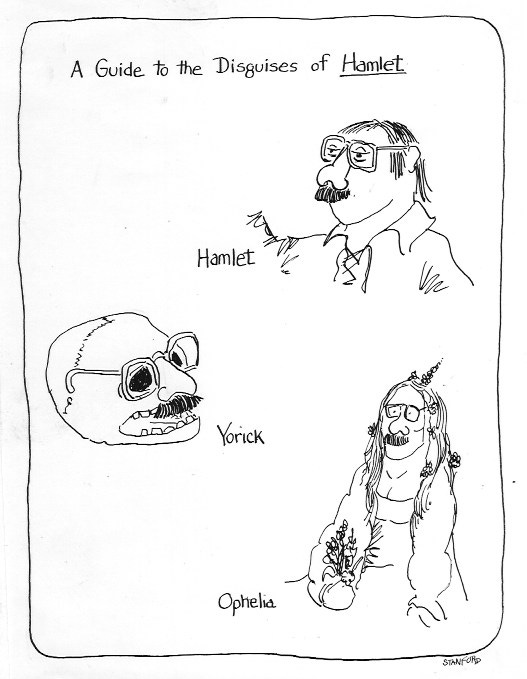WONDERCABINET : Lawrence Weschler’s Fortnightly Compendium of the Miscellaneous Diverse
WELCOME
Following a few weeks of long and involved essays, something a little more contained and straightforward, a potpourri of shorter entries mainly on Trumpist—or should we say Trumpopathic?—themes, though with a sly-merry fillip at the very end.
* * *
ARTWALK: Covering The New Yorker
For those of you living in or passing through New York, you only have a bit more than a week to take in New Yorker art director Francoise Mouly’s superb jewel-box of a show surveying the history of the magazine’s covers at L’Alliance Francaise. It will be closing March 30, and do try not to miss it! As a teaser for some of you, and a compensatory salve for the rest, here is my own video walkabout through one thin tranche of the show, reproducing Francoise’s bulletin board covered over with recent eventually passed-over pitches, many of them, not surprisingly, dealing with our current Trumpian pass.
Click here for Video of Rejected Covers.
* * *
Selections from my Commonplace Book
OLIVER SACKS & PRESIDENT REAGAN
The other day, apropos of everything and all, I found myself recalling an evening over forty years ago (I looked it up, it would have had to have been toward the end of April 1983) when I got a call from my friend and would-be/for-the-longest-time-never-quite profile subject Oliver Sacks (who was still quite deeply occluded and politically untethered in those days) asking me “what on earth that president of yours” had been “nattering on about over the TV” earlier in the day.
El Salvador? hazarded I. “Hmpf,” Oliver hmphed, going on to explain how the speech had been greeted with the most curious series of reactions in the wards at Beth Abraham—gales of laughter and stupefaction, to be specific, but countervailing gales. Which is to say, that some of the ward’s denizens, the aphasics, were suffering from left frontal lobe syndromes that rendered them incapable of understanding a word the president was saying, but they nevertheless evinced a preternatural sensitivity to tone, and they could just tell he was lying. “Thus the feeling I sometimes have,” as he would subsequently record in a piece of his entitled “The President’s Speech” that he would go on to include in his 1985 Man Who Mistook His Wife for a Hat collection,
which all of us who work closely with aphasiacs have—that one cannot lie to an aphasiac. He cannot grasp your words, and so cannot be deceived by them; but what he grasps he grasps with infallible precision, namely the expression that goes with the words, that total, spontaneous, involuntary expressiveness which can never be simulated or faked (as words alone can, all too easily)...
Whereas with some of the other denizens, the “tone agnostics” as he called them, the response, while no less intense, came from precisely the opposite direction. Suffering afflictions to their right frontal lobes, they could no longer grasp the tone, but honed in on the meaning and logic of the words themselves to a preternatural degree. Thus, as Oliver subsequently described one of them in his “President’s Speech” piece,
Emily D. listened, stony-faced, to the President's speech, bringing to it a strange mixture of enhanced and defective perceptions—precisely the opposite mixture to those of our aphasiacs. It did not move her—no speech now moved her—and all that was evocative, genuine or false completely passed her by. Deprived of emotional reaction, was she then (like the rest of us) transported or taken in? By no means. “He is not cogent,” she said. “He does not speak good prose. His word-use is improper. Either he is brain-damaged, or he has something to conceal.”
From there, Oliver went on to conclude his piece with an evocation of “the paradox of the President's speech. For we normals—aided, doubtless, by our wish to be fooled, were indeed well and truly fooled ('Populus vult decipi, ergo decipiatur'). And so cunningly was deceptive word-use combined with deceptive tone, that only the brain-damaged remained intact, undeceived.”
(You can find the whole piece online here.)
Anyway, the point being that with Reagan, an uncanny melding of tonal and semantic registers, each deficient in itself, seemed to combine in a manner with each other such that the deficiencies of one were smoothed over by the efficiencies of the other and vice versa—hence his effectiveness as a political communicator at least among a large segment of American normals of his time.
*
PHINEAS GAGE & PRESIDENT TRUMP
With Trump, though, I found myself thinking, we were dealing with something altogether different, that is, with no such melded felicities whatsoever. And here another set of conversations I used to have with Oliver swung into play.
For back in those days, Oliver regularly had recourse to the famous case of Phineas Gage, a nineteenth century Vermont rail worker who, on September 13, 1848, was directing a gang carving a passage through an outcropping, tamping an explosive charge into the hillside with the aid of a rod, when, as he turned to address his fellows, it detonated prematurely, hurling the rod clean through his jaw and and left eye socket and the left frontal lobe of his brain and on out the top of his skull. Somehow they managed to pull the embedded rod out of his skull and Gage survived, but the virtual entirety of his left prefrontal cortex had been obliterated and what emerged from the experience, and persisted for another twelve years, was an entirely different person.
The case obviously attracted the interest of a full range of internists at the time, and one in particular, a Dr. John Harlow, recorded a particularly detailed clinical note, that being the text that Oliver often recited for me, almost liltingly, from memory:
“His contractors, who regarded him as the most efficient and capable foreman in their employ previous to his injury, considered the change in his mind so marked that they could not give him his place again. He is fitful, irreverent, indulging at times in the grossest profanity (which was not previously his custom), manifesting but little deference for his fellows, impatient of restraint or advice when it conflicts with his desires, at times pertinaciously obstinate, yet capricious and vacillating, devising many plans of future operation, which are no sooner arranged than they are abandoned in turn for others appearing more feasible. In this regard, his mind was radically changed, so decidedly that his friends and acquaintances said he was ‘no longer Gage.’”
And I can almost hear Oliver, dead almost a decade now, reciting the lines to me once again, his brows rising and his eyes widening, as he wonders aloud, “Remind you of anyone?”
Indeed, looking up the exact passage online just now, I was directed to a recent podcast by one Dr Russell Razzaque, a psychiatrist making exactly the same point. The difference between Gage and Trump, however, is that, as far as we know, no rod ever went plowing through Trump’s brain. Whatever diminution in his own left prefrontal cortex Trump has experienced was either inherited (not impossible, his father having been quite the sociopathic martinet as well) or systematically inculcated (see father, above) or somehow self-induced over the years (see The Apprentice), or all three.
In this regard, in his Weekly Dish substack the other day, Andrew Sullivan quoted a disconcerting passage from Kranish and Fisher’s Trump bio, Trump Revealed, to wit:
Dennis Burnham, who lived next door, was a toddler when his mother briefly put him in a playpen in their garden. She returned a few minutes later to find the current U.S. president, then aged five or six, standing at his fence throwing rocks at the little boy. Another neighbor, Steven Nachtigall, now a 66-year-old doctor, said he never forgot Trump ... once jumping off his bike and beating up another boy: “It was so unusual and terrifying at that age.”
Following that up with a kicker from Donald Trump himself:
“When I look at myself in the first grade and I look at myself now, I’m basically the same.”
So who knows. My own takeaway from all this though is how the whole situation brings a whole new meaning to the term “two-incher.” Ordinarily, the term when applied to Trump summons forth memories of Stormy Daniel’s appearance on Jimmy Kimmel’s show a while back (see here, especially starting around 8:55). But the volume of a normal adult left prefrontal cortex, the seat of self-discipline and self-control and the like in the brain, is about 160 square centimeters. Two square inches would be about 12 square centimeters. Which seems about right.
*
MENCKEN & FITZGERALD
Which maybe helps explain Donald Trump. But how to account for his popularity amongst The MAGArati? Here, Garrison Keillor surfaced another apt passage from H.L. Mencken the other day in his Substack:
“Nobody ever went broke underestimating the taste of the American public. The men the American people admire most extravagantly are the most daring liars; the men they detest most violently are those who try to tell them the truth. On some great and glorious day the plain folks of the land will reach their heart’s desire at last and the White House will be adorned by a downright moron. The whole aim of practical politics is to keep the populace alarmed (and hence clamorous to be led to safety) by an endless series of hobgoblins, most of them imaginary.”
I say “another” because some of you may remember the wickedly savvy Mr. Mencken’s earlier appearance in these pages a few issues back, to the effect that
“Democracy is the theory that the common people know what they want and deserve to get it, good and hard.”
Like I say, I don’t know. But what has been accounting for the supine abjection of the billionaire class with regard to Trump’s sociopathy across recent months? In this regard, back in her Vox column on March 7, Constance Grady surfaced a nice passage from Fitzgerald’s The Great Gatsby:
“{The rich} were careless people … They smashed up things and creatures and then retreated back into their money or their vast carelessness, or whatever it was that kept them together, and let other people clean up the mess they had made.”
Which, alas, also seems about right.
* * *
And then, just by way of a blessedly non sequitur reprieve:
A-V ROOM
(with a tip of the hat to my Australian cousin Nic Gruen’s website)
***
ANIMAL MITCHELL
Cartoons by David Stanford, from the Animal Mitchell archive
animalmitchellpublications@gmail.com
* * *
OR, IF YOU WOULD PREFER TO MAKE A ONE-TIME DONATION, CLICK HERE.
*
Thank you for giving Wondercabinet some of your reading time! We welcome not only your public comments (button above), but also any feedback you may care to send us directly: weschlerswondercabinet@gmail.com.
Here’s a shortcut to the COMPLETE WONDERCABINET ARCHIVE.











Yes agree orange man bad. Bad man want no wars. want protect citizen. want big pharma test product be liable. want healthy food 4 kids. want low tax and no government fraud-waste. What bad bad orange fellow! Biden flesh-puppet controlled by uni-party good! low IQ Kamala make good war-marionette too! Thank for deep insight issues affect average American. Very in touch. sacks good. he would-loved chance study speech pattern biden now v. 10 years ago. please must never listen sachs jeffrey.